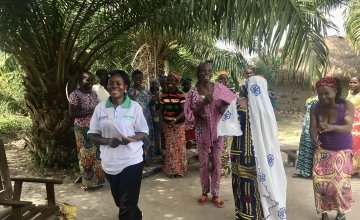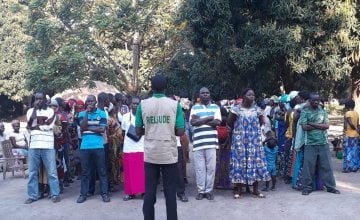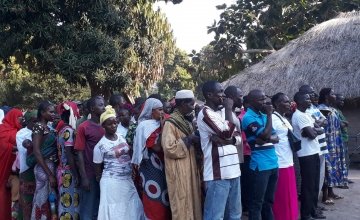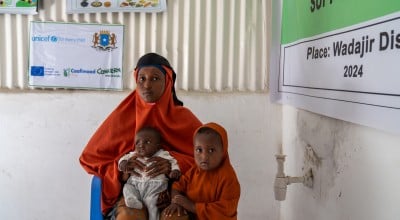
Read our 2024 annual report

Knowledge Hub
Promoting Recovery in Conflict – connection and cohesion in South Eastern Central African Republic

In 2019, in consortium with five other international NGOs (ACTED, COOPI, Oxfam, Impact Initiatives and Free Press Unlimited) Concern launched a large-scale multisectoral intervention funded by the European Union.
A country in need
The programme ‘I LA TENE TI TO NA MBONGO - Tous ensemble pour le sud-est’ has the overall objective of supporting the socio-economic recovery and reconciliation of 21 towns located in five prefectures across the South East of Central African Republic (CAR).
This part of the Central African Republic has not known government control for years, with various militant groups controlling both small and large territories. Boundaries between them are littered with road blocks, taxes and risks.
Recent violence triggered by the national elections and the formation of a coalition of such groups, the Coalition of Patriots for Change, has heightened an already tense environment, bringing in state actors, both from CAR and in terms of international military presence. In such a context, the question must be asked as to the relevance of economic recovery and community resilience.
Like the context itself, the answer is far from simple, however the aspirations of the programme are to tackle root causes of unrest and to promote cohesive, connected and community-based social and economic recovery. Concern and its partners aim to navigate this complexity to install key structures and reinforce capacities that will enhance the resilience and speed the recovery of those affected.
Concern has been active in the Central African Republic since 2014, and more specifically in the southeast of the country in Kouango, Ouaka prefecture since 2015. Through this project, Concern will support communities in four cities: Kouango and Grimari in the Ouaka prefecture and in neighbouring Basse-Kotto with the towns of Mobaye and Zangba. In 2021, it is estimated that over half of the Central African Republic’s population (2.8 million people) are in need of humanitarian assistance.
Persistent and heavy armed clashes recently have weakened local governance capacity, caused displacement both within and outside of the country and limited humanitarian access to large parts of the country. Various needs are observed throughout the country with the southeast being particularly vulnerable and affected.
The RELSUDE programme employs a holistic, integrated approach to early recovery, tackling various sectors in tandem to promote connected and cohesive recovery. Its key components are the following:
Economic recovery
While agriculture activities accounts for half of the country GDP and more than 70% of the citizens of the country are involved in agricultural related activities, the Central African Republic is still heavily dependent on external imports of basic crops to satisfy its population needs.
The recent spike in violence before and after the last presidential and legislative elections, coupled with the medium-term economic effects of movement restrictions put in place during last year, have exacerbated the slowdown in food commodity imports and there have been major supply chain disruptions.
The current situation determined a steady rise in the price of food products on the markets overall the country.

To support the economic recovery efforts of local populations, Concern will provide capacity building and more tangible material support (Seeds restocking kits, agricultural tools, livestock vaccines or veterinary kits) to 610 economic groups.
It will also facilitate their access to credit through the setup of Village Savings and Loans (VSLA) initiatives. In this component of the programme, Concern plans to identify and rehabilitate 11 key economic elements of local infrastructure (market spaces, warehouses and various food processing infrastructures) through a Cash for Work scheme which will
primarily target young from vulnerable households and inject cash in the local economy. In order to faces the high rates of illiteracy in rural CAR, the programme will provide the opportunity for 5500 women to access functional literacy programs with the support of national partners and specialists.
Water, hygiene and sanitation
Lack of functional water points is one of the main barriers keeping communities from accessing clean drinking water with long wait times reported at existing water points, pushing communities to use traditional wells or fetch water from nearby rivers. In the city of Grimari (estimated population is 15000 people), only 17 of the 29 water points available are currently functional, with parts of the city possessing no water points or relying on traditional wells that are not maintained and whose water is not drinkable.
Concern will work to improve access to clean water and proper hygiene practices through the rehabilitation and construction of 30 water points and hygiene promotion through community sensitizations and awareness campaigns, also related to the COVID-19 risks.
In addition to issues with accessing clean water, there is a severe lack of public latrines in target cities and the majority of households do not have the financial means to construct private latrines. Through Concern’s intervention, 8 public latrines will be constructed in public spaces and 210 households beneficiaries will be accompanied in the construction of household latrines.
Social cohesion, community development and protection
Years of persistent instability, displacement and conflict have left communities fractured and divided. Tensions exist between and within communities, undermining the capacity of communities to recover and prosper. Poor levels of social cohesion are reported in project cities and local associations and structures are often not functional or do not have the capacity to implement activities in their community.
Through this component, Concern aims to revitalise the sense of community in urban centres by building the capacity of 96 local associations through training on project management, material support, and assistance in implementing micro-projects in their towns.
In addition, Concern will support local Peace Committees in each city through similar capacity building training. Developing the capacity and leadership skills of community actors will allow them to better assume responsibility of local actions and address conflicts at a community level.

In addition, in order to respond to the multiple needs of gender-based violence (GBV) survivors in remote areas of CAR, Concern will collaborate with national NGOs to support existing referral pathways and strengthen community awareness of GBV and knowledge of how to access holistic care services. In addition, wider communication will be promoted through more far-reaching channels. Through RELSUDE, Free Press Unlimited will work to establish community radios in Concern’s intervention area, which will increase opportunities for communication, education and community sensitization.
The current situation in CAR calls for major, immediate, humanitarian response. In parallel, the prolonged and complex emergency that has been present for years prior to, and is fundamentally interconnected with, the current violence, requires efforts to promote social and economic recovery. In tandem with both local and international partners, Concern’s efforts with RELSUDE aim to promote integrated, connected, community-based resilience and recovery for an area of CAR than cannot wait for peace and calm before doing so.
Since its creation in 2014, the Bêkou Fund has invested nearly 300 million euros/196.7 billion FCFA in CAR for the benefit of 2.9 million Central Africans. Its contributors (the European Union, Germany, France, Italy, the Netherlands and Switzerland) have made a long-term commitment to improve the Central African population's access to basic services (health, water and sanitation) and essential infrastructure.
By accompanying the most vulnerable and supporting economic recovery - particularly in the agricultural sector - as well as national reconciliation and gender equality, the programs financed by the Bêkou Fund lay the foundations for sustainable and inclusive development.
Our partners





